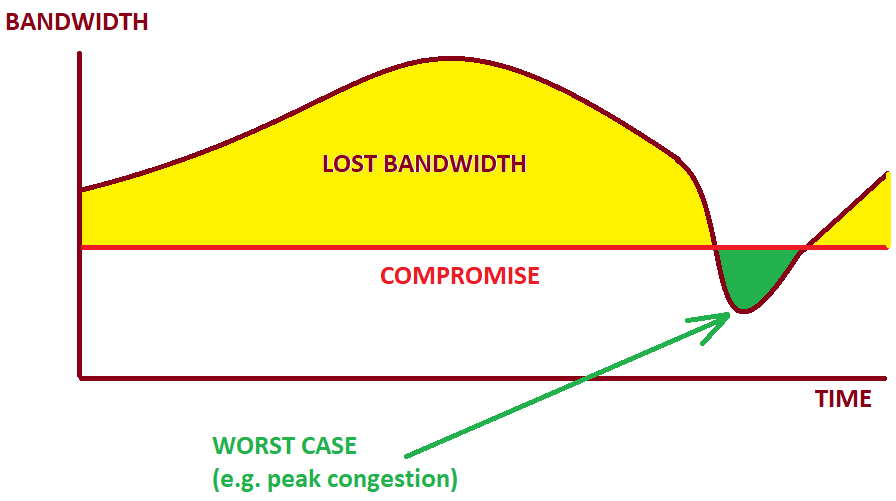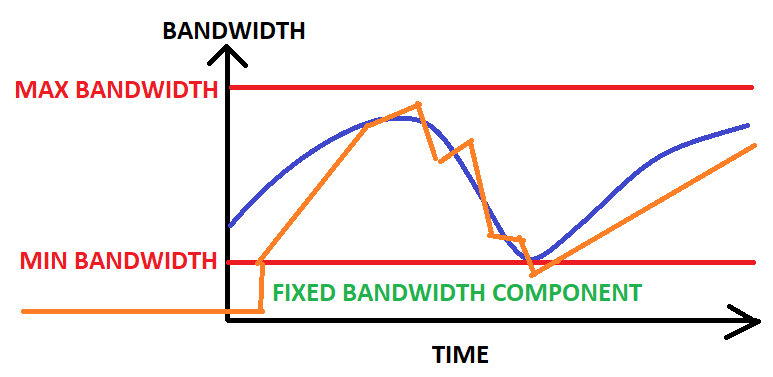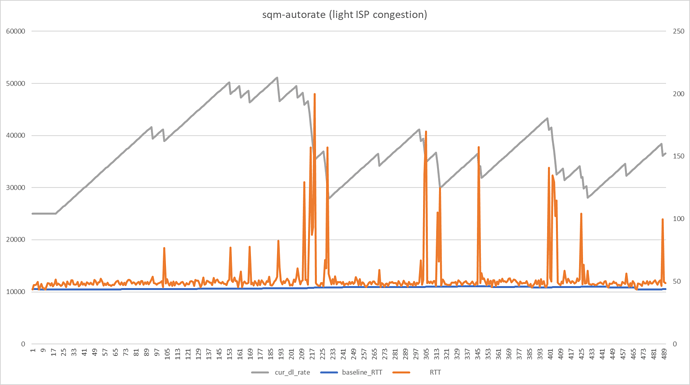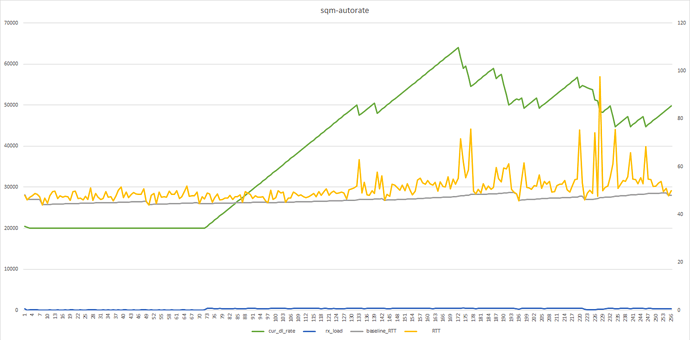xDDDDDDDDDDDDDDDDD
@anon50098793
I will be able restore all my settings on pi4 using this backup if I do a factory reset?
if by reset you mean new fac.img to sdcard and by all settings you mean all common settings then probably ( 93% confidence )...
but there is a semi-large chance you'll end up with the same 'settings' that caused you to want to reset in the first place...?
so if it's for a newer card or something then sure...
Is it okay to ignore this errors
sysinfo-msgs 20211128-2128
[ 2.873067] fsckparts bootpart:/dev/mmcblk0p1 [unclean-fsck-repairing]
[ 3.585540] fsckparts bootpart:/dev/mmcblk0p1 [unclean-fsck-ok]
throttled=0x50000 [one-undervolt+throttle] #20211128-2128
Log from rpi-throttlewatch.sh while doing speedtest on smartphone
rpi-throttlewatch.sh
taskset-aarch64 -c 0,1,2,3 /bin/rpi-throttlewatch.sh -P -C 4
NPROC:4 RUNSSLBENCH:off NPROC_SSL:2
Time Temp CPU Core Health Vcore
21:33:04 47.2'C 1500MHz 500MHz 01010000000000000000 0.8688V
21:33:07 46.7'C 1500MHz 500MHz 01010000000000000000 0.8688V
21:33:10 46.2'C 1500MHz 500MHz 01010000000000000000 0.8688V
21:33:13 47.7'C 1500MHz 500MHz 01010000000000000000 0.8688V
21:33:16 46.7'C 600MHz 200MHz 01010000000000000101 0.8688V
21:33:19 46.2'C 1500MHz 500MHz 01010000000000000000 0.8688V
21:33:22 46.7'C 600MHz 200MHz 01010000000000000101 0.8688V
21:33:25 47.2'C 1100MHz 500MHz 01010000000000000000 0.8688V
21:33:28 47.2'C 600MHz 200MHz 01010000000000000101 0.8688V
21:33:31 46.7'C 600MHz 200MHz 01010000000000000101 0.8688V
21:33:34 46.7'C 600MHz 200MHz 01010000000000000101 0.8688V
21:33:37 46.7'C 1500MHz 500MHz 01010000000000000000 0.8688V
21:33:40 48.2'C 1500MHz 500MHz 01010000000000000000 0.8688V
21:33:43 46.7'C 1500MHz 500MHz 01010000000000000000 0.8688V
21:33:46 47.2'C 600MHz 200MHz 01010000000000000101 0.8688V
21:33:49 47.7'C 1500MHz 500MHz 01010000000000000000 0.8688V
21:33:52 48.2'C 1500MHz 500MHz 01010000000000000000 0.8688V
21:33:55 47.7'C 1500MHz 500MHz 01010000000000000000 0.8688V
21:33:58 47.2'C 1500MHz 500MHz 01010000000000000000 0.8688V
21:34:01 47.2'C 1500MHz 500MHz 01010000000000000000 0.8688V
21:34:04 47.7'C 1500MHz 500MHz 01010000000000000000 0.8688V
21:34:07 47.7'C 1500MHz 500MHz 01010000000000000000 0.8688V
21:34:10 46.7'C 1500MHz 500MHz 01010000000000000000 0.8688V
21:34:13 46.7'C 1500MHz 500MHz 01010000000000000000 0.8688V
21:34:16 47.7'C 1500MHz 500MHz 01010000000000000000 0.8688V
21:34:19 46.7'C 1500MHz 500MHz 01010000000000000000 0.8688V
21:34:22 47.7'C 1500MHz 500MHz 01010000000000000000 0.8688V
21:34:25 47.2'C 1500MHz 500MHz 01010000000000000000 0.8688V
21:34:28 47.7'C 1500MHz 500MHz 01010000000000000000 0.8688V
21:34:31 46.2'C 1500MHz 500MHz 01010000000000000000 0.8688V
good question/s...
the fsck stuff usually happens on the odd occasion and it fixes itself... this is usually after power loss during the boot process... it is more uncommon for the boot partition (partition 1) to need to be repaired...
for the throttle watch results... yes... they do seem possibly something worth investigating....
(my rpi4 always triggered everyboot... due to really thin power wires... but it was/is never really a problem for normal operation in my case)
with yours... both the things combined may indicate substantial drain somewhere in the power system;
- extra / (new)devices? / bad psu?
but if you see the fsck message regularly or with some sort relation to power loss (frequent) then something should probably be looked at...
here is a brief output from throttlewatch on my system showing undervolt was triggered but causing no/less issues than in your output
[root@dca632 /usbstick 48°]# rpi-throttlewatch.sh
taskset-aarch64 -c 0,1,2,3 /bin/rpi-throttlewatch.sh -P -C 4
NPROC:4 RUNSSLBENCH:off NPROC_SSL:2
Time Temp CPU Core Health Vcore
01:46:20 48.7'C 1500MHz 500MHz 01010000000000000000 0.8375V
01:46:23 48.2'C 1100MHz 366MHz 01010000000000000000 0.8375V
01:46:26 48.7'C 1100MHz 366MHz 01010000000000000000 0.8375V
01:46:29 47.7'C 1100MHz 366MHz 01010000000000000000 0.8375V
01:46:32 48.7'C 1100MHz 366MHz 01010000000000000000 0.8375V
01:46:35 48.2'C 1100MHz 366MHz 01010000000000000000 0.8375V
01:46:38 48.2'C 1100MHz 366MHz 01010000000000000000 0.8375V
01:46:41 47.7'C 1100MHz 366MHz 01010000000000000000 0.8375V
01:46:44 48.7'C 1500MHz 500MHz 01010000000000000000 0.8375V
01:46:47 47.7'C 1100MHz 366MHz 01010000000000000000 0.8375V
^X^C
(could also be caused/influenced-by config.txt overclock settings I suppose)
your welcome to add load... but the script itself generates load by default using openssl... (edit: that seems to be only when ran with the full parameters rpi-throttlewatch.sh -P -C 2)
ok when I run it with full parameters i'm getting it too... (undervolt)
[root@dca632 /usbstick 47°]# rpi-throttlewatch.sh -P -C 2
taskset-aarch64 -c 0,1,2,3 /bin/rpi-throttlewatch.sh -P -C 4
NPROC:4 RUNSSLBENCH:1 NPROC_SSL:2
starting opensslbench with 2 cores
Time Temp CPU Core Health Vcore
02:00:09 48.7'C 1100MHz 366MHz 01010000000000000000 0.8375V
02:00:12 47.2'C 600MHz 200MHz 01010000000000000101 0.8375V
02:00:15 50.1'C 600MHz 200MHz 01010000000000000101 0.8375V
02:00:18 49.1'C 600MHz 200MHz 01010000000000000101 0.8375V
02:00:21 50.6'C 1500MHz 500MHz 01010000000000000000 0.8375V
02:00:24 49.6'C 600MHz 200MHz 01010000000000000101 0.8375V
so looks to me like some new issues(demand/power subsystem changes) with newer kernel etc. and maybe not your PSU after all...
I will need to look a bit deeper into this to see if/when this has changed and if I need to change something with scaling or similar or if it's just a transient OS bug/quirk...
thankyou for letting me know...
I will do test with original adapter rpi4 tomorrow
Well i bought mini ups as backup since it's often blank out in my area. I think the setup seem wrong output seller didn't have rpi4 or similar devices to test the electric output. It's been 2 month i used it and only having problem while upgrading openwrt version two times failed(firstboot).
The other one i saw something good in your commit
-12) sqm-autorate via config/sqm autorate='1' (for lte/variable-bw-links)
Is there any tips for the those update in openwrt 21.02? I'm using router 4G cat 19(lte) as internet
Glad you noticed that... it's kind of experimental but it will be in the
next 21.02.x build that I push...
(there is also a zip file that can be installed to test with)
A few more details here;
https://forum.openwrt.org/t/sqm-qos-for-dual-lte-wan-connections/112779/8?u=wulfy23
It's pretty much just the code from the guys mentioned in that thread at this stage
i can't really test it properly as I don't have LTE...
on my system it keeps SQM settings at the bare minimum
(I think it requires load to make it start working or something)
So likely won't be perfect right now... but in situations where
you really need SQM... and have LTE... it still may
offer benefits... ( sacrifice some 'learning/scaling' speed loss to have low latency in general )
I only have 3 new lines in my sqm section to make it work/enable it;
option autorate '1'
option autorate_min_dl_rate '10999'
option autorate_min_ul_rate '2111'
where min rate should be the lowest value for the link...
I did set it like this.
config queue 'eth1'
option interface 'eth1'
option qdisc 'cake'
option debug_logging '0'
option verbosity '5'
option linklayer 'none'
option enabled '1'
option script 'ctinfo_4layercake_rpi4.qos'
option download '49700'
option upload '15950'
option autorate '1'
option autorate_min_dl_rate '29700'
option autorate_min_ul_rate '5950'
i assumed if this working speed gonna over 29,7Mbps since my speed download 30-64Mbps up 18-25Mbps. i did a few speedtest and wavebloat for bufferbloat test but the speed not hit above min_dl_rate
bufferbloat
everytime changes in /etc/config/sqm need to stop/restart sqm-autorate-init.sh to take effect
yeah... this is also what I found... apparently it does not work if there is no load...
yes it can be restarted from that command or just /etc/init.d/sqm restart should also restart it...
here are the things after installing those sqm scripts. I got errors and some software not running at startup
In this case you should probably try the original script... (I've not tested from luci so will look into this > actually it looks like it has some bugs so will have to temporarily remove it... the whole reason to create it was for multiple interfaces... but for a single interface the original script below should be fine)
You can comment out the lines you added to /etc/config/sqm, then rm /bin/sqm-autorate-init.sh then reboot
This is a link to the underlying code I've used;
https://github.com/moeller0/sqm-autorate/blob/main/sqm-autorate.sh
That script needs to be downloaded and edited then run...
This is the thread where it's being developed;
https://forum.openwrt.org/t/cake-w-adaptive-bandwidth/108848?u=wulfy23
where you can give the guys feedback, ask about why it's keeping the rate low...
yes for multiple WAN would be helpful.
I look up into it.
somehow speed can increase about 500Kbps-2Mbps above the minimum set.
I found AX88179 adapters to be absolute garbage
I don't know how well @moeller0's fork works. I think he has been experimenting with various changes. Whatever change is of benefit will get pulled into the main code I am developing.
The code here:
Certainly works at the moment on my LTE connection but it is still experimental. The service file works to enable service but needs to be restarted with any SQM change. Perhaps a call to this service script should be placed inside the main SQM script so that when the SQM script is restarted the autorate service script is also restarted. Also take care to disable logging as otherwise one log line per tick. That said we'd love a day's worth of data output to the memory card on RPi to test over a day's usage.
The readme in the link above gives some help about how the script works.
The script is designed to stay at the minimum set download and upload on zero load. Because without load the capacity of the connection is unknown. When there is a load it then increases the bandwidth until any RTT spike is detected, at which point it eases back.
So the idea is that it recovers otherwise lost bandwidth associated with having to set a compromise bandwidth which won't even work all of the time.
So imagine orange load here. Starts at 0 but increases. It goes beyond what is available so the script knocks it back down.
Here is some real data:
And here:
thanks for the info... I will definitely test both...
and suspected/read about this ramping up behavior on load only... (although couldn't see it happen with the first script on my connection will test yours to see if different and will retest the first script in it's vanilla form in case I messed something up)
hopefully after some feedback from those with LTE links will work again on the sqm restart lock up thing...
The original concept is based on @moeller0's ideas by the way. He came up with a simple routine and has been instrumental in getting a viable solution to work. I wrote the initial shell script and that has been tweaked by @moeller0 and others. Otherwise the script has drawn in a lot of ideas from others in the adaptive thread you linked above so it is a team effort.
Anyway the shell script is more or less working now but still a work in progress and will benefit from further testing and improvement.
A consideration is that the script issues tc qdisc change calls. So if qdisc goes away because SQM is stopped and started again the script will try to call tc qdisc change but the corresponding qdisc had been removed.
@moeller0 would it be enough to just have SQM restart the autorate service script when SQM service is started?
Or maybe we should check relevant qdisc exists before calling tc qdisc change?
# only fire up tc if there are rates to change...
if [ "$last_dl_rate" -ne "$cur_dl_rate" ] ; then
#echo "tc qdisc change root dev ${dl_if} cake bandwidth ${cur_dl_rate}Kbit"
tc qdisc change root dev ${dl_if} cake bandwidth ${cur_dl_rate}Kbit
fi
if [ "$last_ul_rate" -ne "$cur_ul_rate" ] ; then
#echo "tc qdisc change root dev ${ul_if} cake bandwidth ${cur_ul_rate}Kbit"
tc qdisc change root dev ${ul_if} cake bandwidth ${cur_ul_rate}Kbit
fi
Also @moeller0 am I right that your fork is just for testing changes to get pulled into my repository? If so @wulfy23 may want to incorporate the code from my repository rather than the fork I think.
I second the "team effort" description, but I disagree about who designed/drove this, this is mostly your work.
I think that might be the right thing to do, that way we will piggy-back on sqm's hotplug scripts, not sure however how to do that elegantly.
Also an option, but potentially a costly one.
Yes, I just forked to be able to play around/explore. On my fixed rate link the script at best does not hurt, so I can not really test anything diligently and hence all my changes are dubious until cleared by testing...
Fix adjusted PCB stepdown mini ups.
Thanks for detailed info. The schemes are good ![]()
@anon50098793 for this
-35) sqm-autorate re-enable using lynx's variant for rate logic
Is it fixed sqm hook with the script?
procd_lock problem starting background script from sqm itself
i've spent the last few hours on it and thought it was fixed but have not nailed it yet...
maybe someone else knows what's going on... basically when the autorate script is spawned via sqm itself... (child process or something?) it hangs procd_lock() (so no subsequent stop/start/restart actions will run) maybe because it never exits or something...
starting it manually is ok... so i'll probably give up trying to start/restart from sqm soon unless someone knows a way around the lock problem...
and create a separate 'service' that spawns the autorate.sh scripts themselves... (and associated hotplug / other background detection of sqm service state change / reload sort of thing)
edit: updated the tar file to include a service 'autorate'
if you unzip the tar from '/' and enable and start the service;
/etc/init.d/autorate enable
/etc/init.d/autorate start
you can test it out... but it's very rough still in how it logs things etc. etc. ( it just runs sqm-autorate-init.sh start and sqm-auto-rate-init.sh stop but in silent mode... if you don't see something in ps wwww | grep autorate then just try those commands to start it yourself and see whats going on... it also has 'status' )
will likely take a week or so to properly iron out all the bugs...





